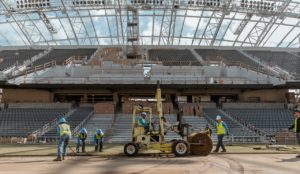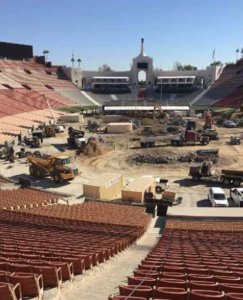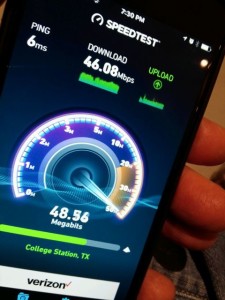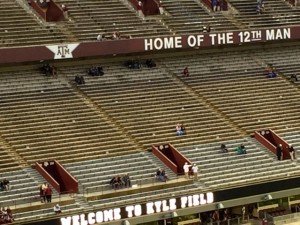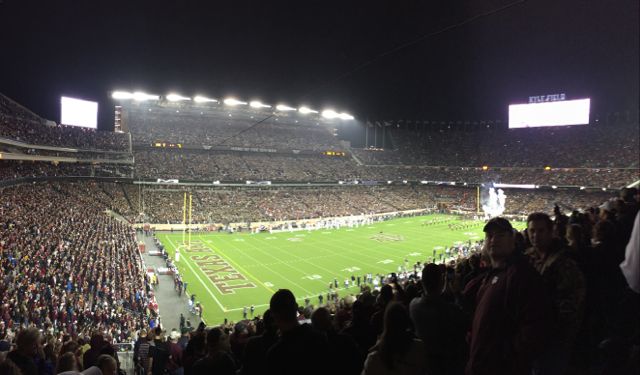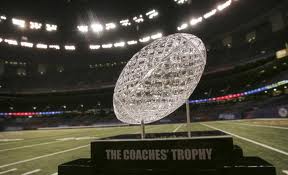Three Los Angeles-areas venues are under construction for soccer, football and the 2028 Summer Olympics.
Between the cranes, earthmovers and swarms of fluorescent vests, you’d be forgiven for mistaking the Los Angeles basin for a construction zone. Sporting-wise, there are three construction zones, including a new stadium for a Major League Soccer latest expansion franchise, the venerable Coliseum gets a much needed renovation, and a bling-y NFL stadium starts to emerge from the silt of the Angeles alluvial plain.Construction or renovation plans for all the venues were underway before the International Olympic Committee awarded the 2028 Summer Games to Los Angeles last fall; all three venues are expected to host Olympic events in a decade.
Banc of California Stadium opening this April
Editor’s note: This profile is an excerpt from our latest STADIUM TECH REPORT issue for Spring 2018, which includes a look at Wi-Fi performance during the Final Four, a recap of wireless performance at Super Bowl 52, a profile of the Vegas Golden Knights’ T-Mobile Arena and more! DOWNLOAD YOUR FREE COPY right now from our site!
Let’s take them in the order they’re expected to open. In its inaugural season, Major League Soccer’s newest franchise, Los Angeles Football Club, is moving with speed and efficiency to make sure the Banc of California Stadium is ready for LAFC’s first home game April 29.
The 22,000-seat venue features steep stands (35-degree angles), with no seat more than 135 feet from the playing field. IBM was tapped to handle the stadium’s technology requirements in October 2016; Ruckus supplied the access points for the new stadium, according to Christian Lau, LAFC’s VP of information technology. About 500 APs will blanket the stadium with Wi-Fi; Lau told Mobile Sports Report that number could “possibly trend higher.”
Right next door (literally) is the Los Angeles Coliseum, where demolition began in January after the NFL’s Los Angeles Rams playoff loss to Atlanta. Located on the campus of the University of Southern California, the Coliseum is home field for both the Rams (at least til 2020… more on that in a second), and the USC Trojan football team. The Coliseum has already hosted opening ceremonies for two Olympiads and is poised to do the honors again.Coliseum upgrade means fewer seats, more Wi-Fi
In the meantime, construction crews are working 16 hours a day, six days a week, according to Derek Thatcher, IT manager at the Coliseum and an employee of USC, which oversees and administers the venue for Los Angeles County. This is the eighth renovation of the 97-year old venue; in addition to making the bowl ADA-compliant, this latest upgrade will add more aisles and larger seats, reducing capacity from 93,607 to 77,500.
New Wi-Fi is also part of the renovation plan; no word yet on which vendor will supply gear, though Mobilitie donated Aruba APs last year for use in the student section and elsewhere in the bowl.
About half the Coliseum’s $270 million renovation will be done during this year’s football offseason; a new field and refurbished seats will be ready for the Rams and Trojans by late summer. Remaining construction and upgrades will be completed in the 2019 offseason, according to Coliseum officials.
Meanwhile, 9 miles southwest of USC in the LA suburb of Inglewood, the arcs of a bowl for the Los Angeles Sports and Entertainment District at Hollywood Park
are taking shape. Construction crews broke ground in late 2016 to transform a 300-acre site into a gleaming new sporting destination. The $2.6 billion complex will be shared by the Rams and the Los Angeles Chargers starting in 2020; LA Stadium is scheduled host the Super Bowl in February 2022.
With a capacity of 70,000 (expandable to 100,000), the stadium’s indoor/outdoor design and a two-sided, 120-yard oculus video display are already generating buzz. Site managers haven’t mentioned any network technology or which vendors they’re considering for wireless and other IT requirements. LA’s Olympic planning committee also reserved the option to use the stadium and the Coliseum for dual-venue opening and closing ceremonies in 2028. Using the Coliseum satisfies the Olympic purists; mixing in LA Stadium would provide the glitzy spectacle global audiences have come to expect from Olympics hosts.
